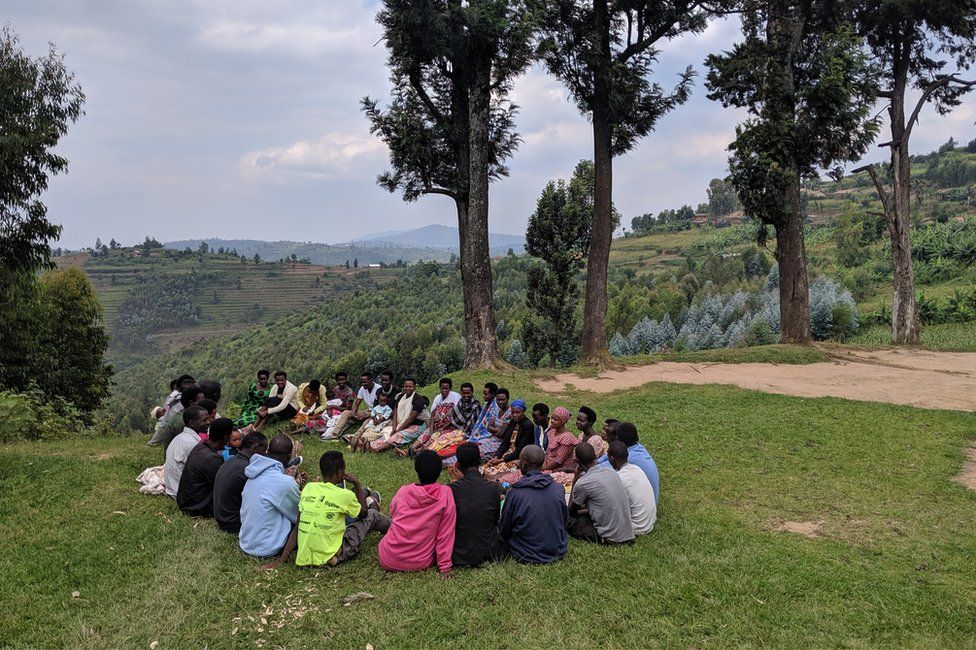
Continuing our series of articles from our Annual Report 2022/23, we outline here our work on our Young Survivors Counselling Project.
Thousands of youthful survivors of the 1994 genocide are only now confronting the horror of seeing their families murdered. They struggle to make ends meet, alone and vulnerable, prone to depression and hopelessness.
Through support from our partner Network for Africa (N4A) we are working with AERG to train counsellors who in turn train local people to become counsellors. The counsellors are themselves survivors who have endured trauma, so they are familiar with the challenges faced by people with depression and other mental health issues. The counsellors are coordinated by SURF Senior Key Worker, Emilienne Kambibi.
At the beginning of 2022, 273 programme participants were recruited by SURF’s counsellors (140 men and 133 women), from the Southern and Eastern provinces. They formed themselves into 12 peer counselling groups and selected 24 Peer Support Counsellors (PSCs) – 1 man and 1 woman per group. The PSCs’ role was to implement and moderate peer counselling sessions, and refer individuals to the counsellors for extra support if needed. They met as peer support groups every two weeks. The PSCs were also the ‘eyes and ears’ of the group participants, and offered extra support e.g. home visits where needed and alerted SURF’s counsellors to any issues that needed their intervention. The PSCs received 4 days’ training in trauma counselling and quarterly supervision for support with difficult cases.
Among the extra support they offered participants was preparation for the genocide memorial commemorations in April – for 10 participants it was the first time they had felt able to take part. It is a difficult time for survivors, and 64 participants experienced PTSD, including 2 complicated cases that were referred to health centres. Over the course of the year, 114 participants (35 men, 79 women) received individual counselling (842 counselling sessions in total); 298 participants (88 men, 210 women) were visited at home and 15 family conflicts were resolved as a result of home visits.
In addition, the counsellors carried out psycho-education covering psychological wounds and healing, the importance of commemoration, forgiveness, resilience, patience and acceptance, the effect of choice, family planning, drug abuse and planning for the future. In addition to receiving supervision every two months, SURF’s counsellors also received training in the connection between conflict and mental disorders; drug abuse and mental health; writing and editing reports; non-violent communication; therapeutic methods; and emotional freedom techniques.
Social networking between participants increased confidence and trust between the group members, and saw some of them carrying out extra activities such as building toilets for group members and helping with cultivating crops and vegetable gardens. In addition to the obvious benefits of group counselling, the participants mentioned the benefits of sharing their individual experiences and a reduction in isolation which gave them hope for the future. Local government/leaders noted positive changes in the participants, for example a reduction in drug use and starting income generating activities. This was echoed by community members who noted a reduction in conflict and positive behaviour change.
N4A are extending their support in 2023, and 341 new participants have been enrolled on the programme – 132 men, 209 women. They are from Rwamagana District in the Eastern Province (Mwurire, Gahangeri, Rubona and Muyaga Sectors) and from Ruhango District in the Southern Province (Ruhango, Byimana, Bweramana and Ntongwe Sectors).
K.V *
K.V is a 38-year-old married man with 3 children. He lives in Ruhango district, Byimana sector. He was the youngest of 6 children but was the sole survivor in his family. He was only 12 years old during the genocide when he saw his entire family killed.
K.V does not show happiness is his eyes anymore. “My happiness comes only after drinking a lot of alcohol, I have seen bad things during genocide, and I am not sure if I will be happy one day like others.”
K.V is always conflicting with his neighbours saying that they hate him. He has thought about suicide many times and tried to take his life. But the rope snapped, and he survived. He was very saddened by his sister who was 15 years old during genocide. They were hiding together in the bush. The killers took her while he was watching, and 4 men raped her. His sister’s image always come into his mind. He is very sad because he doesn’t know where they killed her, and he has never found her body in order to give her a decent burial.”
In his daily life, he presents insomnia, irritability, aggressive behaviours, hopelessness, loneliness, avoidance, nightmares, negative thinking, suicidal ideation, alcohol addiction, antisocial behaviours like family conflicts and relationship problems.
Counsellors have started helping the client through both group and individual therapy. And different relaxation techniques are being used in order to activate positive resources. He will keep attending counselling sessions until the end of this year, 2023.
